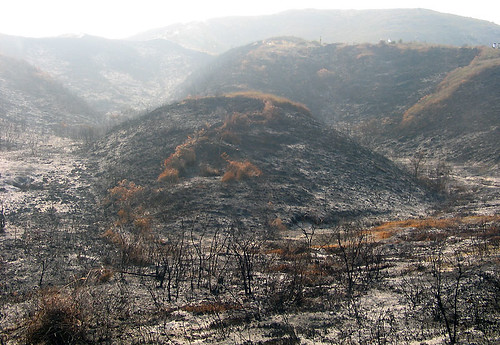
Ching Ming, the Grave-sweeping Festival
“A drizzling rain falls like tears on the Mourning Day;
The mourner's heart is going to break on his way.
Where can a wineshop be found to drown his sad hours?
A cowherd points to a cot 'mid Apricot Flowers.”
This well known poem by Du Mu of the Tang Dynasty has described well the normal weather condition at Ching Ming – it rains. In fact as far as I have remembered, 80% of the past Ching Ming Festival were raining days. The Ching Ming Festival this year was a bit unusual. It did not rain, just being warm and cloudy with occassional sunny spells, but not a single drop of rain. The even more unusual (and luckily) thing was, there was only 13 reports of hill fire.
For the Chinese, it is a day to remember and honour one's ancestors, and to tend to the graves of the departed ones. It is also the time when spring returns to the good earth and the land is greened again by the newly sprouted, a perfect time for the family to have a stroll among the greenery of the countryside after tending to the graves of the ancestors. The act of strolling in the field in spring time in such occasion was called “Spring Visit” or “Stepping into the Green” in the ancient time. This had been a long-time custom in many parts of the country for Ching Ming Festiival, and hence the other name for the occasion, “The Stepping into the Green Festival”. Some people (e.g. the people of Shantou region) are still following the custom nowadays.
As the weather normally starts to get warmer and wetter around the time of the Ching Ming Festival, it is also the right time for planting trees and corps, there is an old Chinese saying “It is the right time to plant the melon and bean seedlings around Ching Ming, so are the saplings”. Planting trees at Ching Ming was another old Chinese custom.
Sweeping the graves, offering food and libation to the ancestors and departed family members during Ching Ming is still a popular custom followed by many Chinese people nowadays. However, the customs of “Stepping into the Green” and tree planting have long been forgotten by many. Instead, there is a new replacement - “Burn to the ground”.
There are two important dates for remembering and honouring the ancestors in Chinese custom, one in the spring time, namely the Ching Ming, and the other in the autumn, namely the Chung Yang. Six months after the last tending to the graves, they must have been covered by the overgrown again. Due to laziness, some people just set the grave ground on fire to clear all the overgrown. Being careless during the common ritual of burning the offerings made of papers to the ancestors is also another cause of hill fire. But the most ridiculous of all is the intentional burning of the whole surrounding area to the ground by some selfish, immoral and foolish people, just base on the groundless speculation that burning the whole place will bring them good fortune and wealth. This is a crime that not only destroy the vast area of vegetation and all the living things within the area, but also threaten the lives and properties of the nearby villagers and hikers. In 1999, there were a total of 443 reports on hill fire in a single day during Ching Ming, and 300 hectares of hillside bushland was burned to ground. In 2001, 35 hikers and grave-sweepers were trapped by the hill fire and nearly died at Yuen Long.
Introducing such a disaster to nature and other people just for the sake of wishing for their own good fortune and wealth, I do not believe that their ancestors would answer such immoral and evil prayers from their descendants.
清明時節
清明時節雨紛紛
路上行人欲斷魂
借問酒家何處有
牧童遙指杏花村
唐朝詩人杜牧的七言絕詩《清明》家喻戶曉,清明會下雨,好像是正常不過的事,而事實上在我記憶中,清明時節十有八九都是下雨天。今年清明雖然有薄霧,但卻一丁點雨也沒下過,而且氣溫偏高高,還有陽光,反而有點不習慣。不過比較「意外」而且慶幸的是,今個清明本港只發生了十三宗山火。
清明是華人傳統拜祭先人和掃墓的日子,時值大地回春,草木吐綠,一家大小出遊到鄉郊掃墓,正好順道郊遊。春遊在古時又稱「探春」、「踏青」,古人向有清明踏青活動的的習俗,故清明又有「踏青節」之稱,中國部份地方(例如潮汕人)仍保留有清明日郊遊踏青的活動。
清明前後氣溫升高,春雨紛飛。雨量增多,種植樹苗成活率高成長快。因此,中國自古以來亦有清明植樹的習慣,農諺中亦有「清明前後,點瓜種豆。植樹造林,莫過清明」的講法。
近代人清明節祭拜祖先、悼念已逝的親人的習俗仍很盛行,但對於踏青春遊和植樹的習俗,卻完全忘記了。不再踏青、植樹之餘,似乎還多了個把綠野林木「徹底燒清光」的習慣!
華人祭祖傳統中,清明重陽是一年中最重視的春秋二祭,半年前清理過的祖墳,大概又重新湮沒在雜草叢之中,有人為貪圖方便快捷,採取了火燒的方法清理雜草。掃墓者隨意在山間墓地焚燒冥鏹,任由仍未熄滅的火種飄散,亦引發連場山火。不知是甚麼時候開始,有人基於所謂「火燒旺地」的說法想當然,故意縱火焚燒山地,以「保佑自家轉運發財」。這些自私、愚蠢兼缺德的行為,不單令大片草木一日之間在烈火中化為焦土,亦嚴重地威脅到附近民居和遠足人仕的生命財產。根據記錄,1999年清明節當日,香港總共就發生了443宗山火,300公頃林木化為焦土;2001年重陽元朗橫洲一場山火,更令35名遠足及掃墓人士被困於山火之中,險些葬身火海。
為了自家轉運發財而荼炭生靈,如果祖先有靈,恐怕也不會保祐如此缺德造孽的子孫。
No comments:
Post a Comment